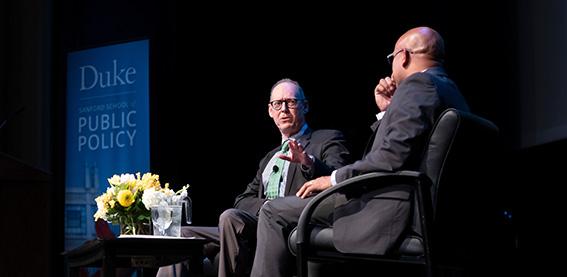
If the global health community has a rock star, it’s Paul Farmer.
A physician and medical anthropologist who is internationally known for his work with people living in poverty, Farmer gave the David Rubenstein lecture in Page Auditorium in conversation with Sanford Associate Professor Manoj Mohanan on Wednesday.
A Duke alumnus, Farmer joked that he used to come to Page for rock concerts, and that he and John Bolton would perform a duet later.
Farmer flew in from Rwanda, where he has been involved in the establishment of the University of Global Health Equity, which opened last year.
“To have a university based on equity, focused on equity from the beginning -- that was an exciting prospect,” he said.
Rwanda has seen amazing progress in health outcomes since the 1994 genocide. “The country has the steepest decline mortality rates ever,” Farmer said.
The outcomes for AIDS and tuberculosis are better than in urban America, he said. It’s because the country has a publicly funded program, with social supports, delivered by community health workers.

In rural communities without doctors, community health workers can be key to delivering basic care, especially for chronic diseases. In all of Farmer’s roles, as co-founder of Partners in Health, as UN Special Adviser, as a physician at Harvard Medical School and at Brigham and Women’s Hospital in Boston, he advocates for training more community health workers and upgrading their skills.
Trust in Healthcare
Mohanan turned the conversation to the question of the breakdown of trust in health care, both in the developing world and in the United States.
The solution is, “Shut up and listen,” Farmer said.
In the United States, “the pressures of the fee-for-service system – it’s rotten in that way – compromise trust significantly. There’s not a lot of time to listen if you’re being clocked,” he said.
How authorities handle coronavirus, COVID-19, is important, Farmer said. If the outbreak is handled through “containment without providing care, that doesn’t work well. If you’re not concerned with treatment, that’s a colonial recipe for mistrust.”
He pointed to a recent JAMA paper had some scary news: 26 percent of patients in a COVID-19 cohort required critical care. That rate can overwhelm a health care system. He was also concerned about young adults and children, even though so far, the virus seemed to have a greater impact on older people. Proper medical care does make a difference in the fatality rate.
“When it comes here, people will get care,” he said.
Availability of doctors
Mohanan asked about developing countries that worry about the migration of doctors.
Trying to govern where people migrate is “stupid and morally questionable,” Farmer said. Medical professionals want to use their skills and to train other people. They also want what everyone else wants: to be paid decent wages and have a decent place to live.
“The data suggest that professionals are people too,” Farmer said.
Countries such as Rwanda and Liberia have had success in pulling people back by providing staff, equipment and a good standard of living. “First build housing, then the hospital,” he said.
Farmer thinks building capacity is crucial to creating global health equity. He gave the example of Haiti after the 2010 earthquake. Port-au-Prince, the capital, had been the center of medical training for the country, but all the buildings were in ruins. “One third of the nursing students and doctors did not survive,” Farmer said.
When millions of dollars in donations flooded into the country, Farmer advocated building an academic teaching hospital. The efforts faced the “censorious opinion” of experts in disaster relief, international aid and medicine, he said. In spite of that, Partners in Health worked with the government of Haiti and in 2013 opened the world’s largest solar-powered teaching hospital.
Q & A
During the question and answer period, several audience members asked how to address the question of mistrust.
Farmer said in addition to listening, it’s is necessary to invest for the long-term. In Rwanda and Haiti, “I’ve seen the power of working with those responsible for public well-being,” he said.
Nongovernmental organizations (NGOs) can help by supporting a public safety net. “There’s no law that says an NGO can’t support a public hospital,” he said.
Change can come through “pragmatic solidarity,” he said.
“Solidarity that isn’t short term, but cultivated over the long term. Pragmatic in wanting to be involved,” he said.
Featured Video




